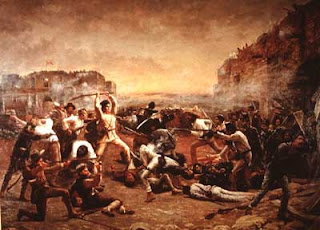Last week the Texas State Board of Education adopted a textbook content plan for all social studies students in the state of Texas. You can read the report on the Board's action published in The Dallas Morning News here.
The article and, even more, the actions of the board drive home a point about the writing of history that seems to escape many of us.
History is always interpretation.
The notion of historical fact remains largely mythological by definition. At best, history is the craft of cobbling together various sources into a story that then can expect to be challenged by other historians with additional sources and new interpretations. This process of give and take, peer review and intellectual refinement and debate is the stuff of the profession. It provides cause for conventions and symposiums and professional meetings. It provides content for various historical journals. In the battle we discover the professional concerns of serious historians. Of course, non-historians can enter the fray as well, as evidenced by the action of the Board of Education whose actions were admittedly more political than historic in any sense.
Still, there is no such thing as an objective historical narrative or the definitive version of any historical event, period or epoch that we can rely on without healthy skepticism or continuing challenge.
Further, the historian's own social context, her own life history, his educational experiences and her personal values all will enter the process of "doing history." Great historians labor to overcome the adverse affects of outside influences, but pure interpretative analysis just doesn't happen. Sources must be chosen, evaluated, reject or included. The result: the latest historical interpretation to be read, appreciated and critiqued for the good of an on-going quest for better, more complete understandings.
Historians like John B. Boles, Howard Zinn and David McCullough, to name only three, know (in Zinn's case, sadly, "knew") this reality. Historians spend their lives working their sources to discover and craft a story that we can dig into, gain insight from and use in the living of our own lives.
While the recent actions of our State Board of Education leave an awful lot to be desired when it comes to the source choices they made, it should not surprise us that they chose. That's just want historians do. Even non-historians, like our state Board of Education, make such choices, in this most recent case with a political and value agenda to promote.
Speaking of choices and sources, be sure and read what my partner Rev. Gerald Britt wrote about the Texas textbook plan. I think you'll appreciate the choices he makes and the story he tells. To read what he has to say click here.
